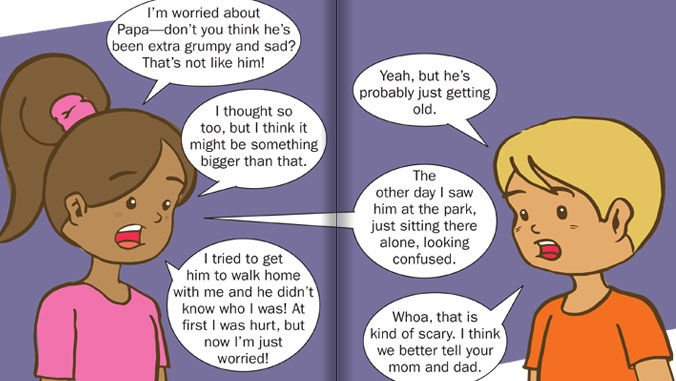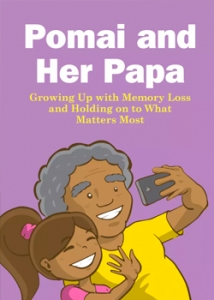
An energetic little girl named Pomai wants nothing more than for her grandfather, Papa, to play with her. But Papa is losing his memory and unable to make poi with Pomai and take her to the beach like he used to.
That is the theme of Pomai and Her Papa: Growing Up with Memory Loss and Holding On to What Matters Most, a free booklet written by researchers at the Myron B. Thompson School of Social Work at the University of Hawaiʻi at Mānoa. It is published and being distributed through the school’s federally funded Hā Kūpuna project, a resource center for Native Hawaiian elders and their families.

“Children are deeply affected by dementia in their families, and yet often they are not viewed as caregivers who need education and support,” said Professor Colette Browne, a co-author and Hā Kūpuna’s principal investigator.
What’s happening to Papa?
In Pomai and Her Papa, the protagonist receives guidance from a teacher, social worker and doctor, and works hard to understand the changes she is seeing in Papa.
The illustrated booklet, appropriate for ages 8 and older, relays valuable information about dementia, with Alzheimer’s disease being the most common. More than 66 million people nationally and 29,000 people in Hawaiʻi live with the disease.
“People in Hawaiʻi are especially affected by Alzheimer’s disease, in part because of the high rate of multigenerational homes here,” said Browne. “We wanted to provide a free resource for members of our communities who are facing a diagnosis of dementia in a loved one.”
The publication includes information on local and national resources where youth and families can seek answers, find support and combat feelings of isolation and confusion.
“As Papa begins to lose his memory, get lost and act differently, Pomai sets off on her journey to learn how to help Papa and her family,” said Shelley Muneoka, Hā Kūpuna project coordinator. “The booklet educates young caregivers about dementia and provides a guide of age-appropriate ways to best help.”
A free download is available. To request printed copies, send an email to Muneoka at muneokas@hawaii.edu.
—By Theresa Kreif

